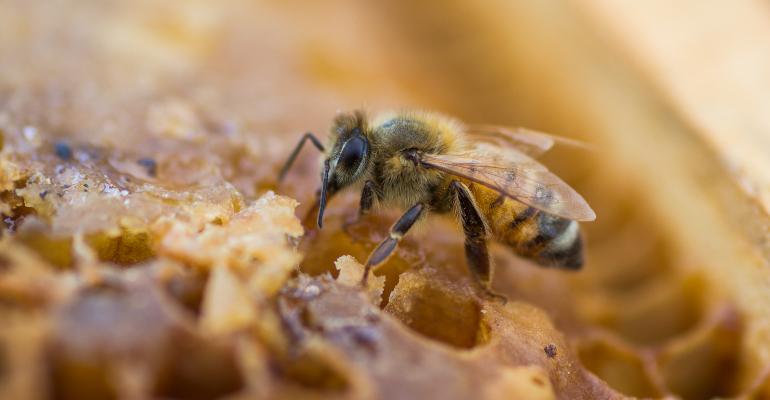November 4, 2019

Honey bees contribute more than $20 billion a year to U.S. agricultural production.
About 100 crops rely on honey bees for pollination. Honey bees increase yields and enhance crop quality.
It’s estimated that bees pollinate around a third of the food consumed worldwide. Honey bees are critical in producing many fruits and vegetables.
No crop is more dependent on honey bees than almonds.
Almost 80 percent of all honey bee colonies in the U.S. (2.7 million) are positioned in orchards annually to pollinate 1.4 million acres of almonds currently planted in California. Those trees produce about 2.5 billion pounds of almonds annually.
That is the primary reason Farm Progress/Western Farm Press developed Protecting Pollinators, an online continuing education course for California Department of Pesticide Regulation licensee on its internet platform agceuonline.com.
“Honey bees are essential to almond production,” said Bob Curtis, pollination consultant and retired director of Agricultural Affairs for the Almond Board of California. “Every almond we eat exists because a honey bee pollinated an almond blossom, so it’s in farmers’ best interest to keep them safe. Our livelihood depends on it.”
Protecting Pollinators is one of 18 courses offered at agceuonline.com. It is currently accredited for one hour of continuing/sustainable credit in California as well as in Arizona, Florida, and Washington, and by the American Society of Agronomy for its Certified Crop Adviser (CCA) program.
The course examines the stresses on the honey bee population and provides solutions to counter Colony Collapse Disorder, nutritional requirements, pesticide stewardship, parasites and pathogens, as well as rules and legislation to protect honey bees.
The course was developed from information provided by the Almond Board, The University of California, Davis entomologist and commercial beekeepers.
More than 100,000 courses have been completed on the agceuonline.com platform, making it the largest internet based accredited agricultural continuing education platform in the U.S.
The platform has registered more than 14,500 users worldwide on the site.
Convenience and time-saving are the key attractants for the popularity of the online accredited courses that are available 24/7. Licensees not only receive certificates for completed hours but their hours/units are also reported to all accrediting agencies. To date, agceuonline.com has a working relation with 26 accrediting agencies nationwide.
For additional information, contact CE program coordinator Cheryl Ogle, (559) 326-7405, [email protected]
You May Also Like




